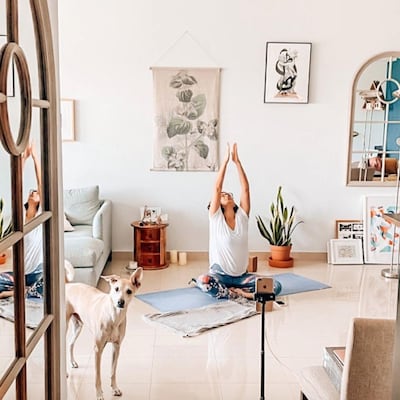A few months ago, many mums-to-be were simply focused on having a healthy pregnancy and putting together a birth plan. But the pandemic has, for a lot of people, put a massive spanner in the works.
While living through the coronavirus outbreak is a concerning situation for everyone, for women who are preparing to give birth – whether for the first time or the fifth – it's a particularly stressful time.
Some are struggling with finances, others have lost their jobs and for many, the biggest change has been the loss of freedom of movement and regular routines.
Should we also be worried that mums-to-be are more likely to contract the virus? The short answer is no. Pregnant women have not been found more likely to catch Covid-19 than the rest of the general population, according to the Royal College of Obstetricians and Gynaecologists in the UK.
Of course, that doesn’t mean you don’t have to be extra careful. “Pregnancy can, however, affect the body’s immune system,” says Dru Campbell, head midwife and lactation consultant at HealthBay Polyclinic in Dubai.
“Therefore, with viral infections in general, including Covid-19, some women who are pregnant can experience an elevation in symptoms. It is extremely important pregnant women try their very best to avoid contamination.”
Regular hand washing, eating nutritiously, staying hydrated, social distancing and wearing a mask in public are all tips Campbell recommends.
And if you do contract the virus? Will baby get sick, too? “Some research is demonstrating that transmission from mother to baby within the womb is probable, however two reports from China suggested that there was no clear evidence for this and amniotic fluid, cord blood, placental swabs and breast milk samples from infected mothers were negative for Covid-19,” Campbell explains.
Cecile de Scally, lead midwife educator at Dubai's Malaak Mama & Baby Care, also says there is no current evidence to suggest that there will be any developmental concerns in-utero. “There is probable maternal fetal transmission during the postnatal period, however, this does not suggest that the mother cannot breastfeed, only that she should take all necessary precautions such as wearing a mask if she is symptomatic.”
If you experience any symptoms of the coronavirus, de Scally says to consult your doctor immediately.
As long as we follow all of the general advice and adhere to the UAE’s social distancing regulations, then this can still be a joyful time.
Here are a few expert tips on how mums-to-be, particularly in their third trimester, can happily and healthily navigate their way through lockdown.
1. Engage in safe exercise
Not only does exercise boost our mental health, but it also helps women prepare for labour, if done correctly. As long as you were exercising regularly before getting pregnant, then you can continue to do so throughout pregnancy, says de Scally.
"If not, walking for 30 minutes a day is gentle enough, with great benefits to circulation, as well as helping tone muscles for birth." Take a look at this article for tips on how to get 10,000 steps in without leaving your home.
Campbell adds: “It is important pregnant women engage in low-impact activity only. If the pregnancy is low risk – nil medical concerns for mother or baby – 30 minutes of exercise per day can be very beneficial both for physical and mental health. Exercise in pregnancy has been found to prepare you for labour / birth and assist with increasing your circulation.”
She suggests keeping active by walking around your home, going up and down stairs where possible and doing gentle yoga stretches.
“Ensure you listen to your body and, if you are feeling tired, faint or not well, stop the exercise you are participating in and rest. If your obstetrician has advised for you to rest for medical reasons, it is important to follow their recommendation.”
Exercises women in their third trimester should avoid are any abdominally focused workouts, anything that may cause you to fall and those that are downward-facing, adds Campbell. “You can engage in squats as long as you are low risk, used to squatting exercises and you are listening to your body. If you are finding any exercise uncomfortable or painful, ensure you stop and rest. It may be best to avoid this exercise in the future.”
2. Have a go at prenatal yoga
Women who are pregnant at a time of crisis need to remember that whatever they’re exposing themselves to physically, mentally and emotionally can be translated in some way to the baby, says Dina Ghandour, a yoga instructor and certified doula.

“So make sure that, as a mother, you’re staying calm, so that the baby is also experiencing the positive benefits of that physical and physiological state of well-being, too,” she says.
To achieve a relaxed state, she recommends trying a prenatal yoga class that includes breathing techniques. “The main idea is to allow the exhalations to be longer than the inhalations, which signals the parasympathetic nervous system. That is what we really want in order to feel calm and relaxed, and to enjoy those physiological benefits.”
Take a look at this article to learn about more yoga classes being run online by UAE instructors.
3. Take a hypnobirthing course
“Self-care towards the end of your pregnancy is extremely important, especially in the current situation,” says de Scally. “Ensuring adequate sleep and a very good diet will make sure your immune system is optimal.” So will preparing for birth using hypnobirthing practices, she adds.
Hypnobirthing courses, which are currently available online in the UAE, teach a method of pain management that involves a mixture of visualisation, relaxation and deep breathing techniques. “The relaxation techniques used are beneficial to ensuring a good night’s sleep, as well as a relaxed mother during labour,” says de Scally, who is currently running private sessions via Zoom.
For more antenatal and hypnobirthing classes to take online in the UAE, click here.
4. Get into meditation
Campbell recommends engaging in some type of meditation daily. “You can use a guided meditation app to assist you,” she says. There are several free options on the market and even 10 minutes a day can help calm your mind, she adds. “Try to practise mindfulness throughout the day.”
For an expert's guide to starting your own meditation practice, click here.
5. Take some time for yourself
It can be difficult when you don't live alone, especially if you already have children, but try to take some time for yourself every day, says Campbell. "Give yourself the gift of a period of time daily – one hour, if you can – to switch off all devices and have some time just for you. You could have a nap, watch a positive movie, read a book or relax in a nice, warm bath." If you are finding yourself overwhelmed by information on Covid-19, Campbell suggests only reading research-based media sites and limiting your exposure to reading or watching news reports.
De Scally agrees. She also suggests having a warm bath, practising breathing techniques and even getting a massage “if you have a willing husband who is happy to rub feet or use light-touch massage".
"These techniques can be easily taught online and help increase the body’s natural endorphins.”
6. Use a ‘worry tree’
Dr Sarah Rasmi, founder of Thrive Wellbeing Centre, which recently opened the UAE’s first maternal mental health unit, says one of the activities she suggests pregnant women use is something called a “worry tree”. “It’s a sheet in the shape of a tree, a decision tree, which allows us not only to recognise when we’re worried, but also allows us to differentiate between helpful and unhelpful worries,” she explains.
A helpful worry alerts us to something we need to address. For example, if a woman were to notice she was having labour pains and started to worry, then that would cause her to reach out to her doctor or go to a hospital.
An “unhelpful worry”, on the other hand, is hypothetical in nature – the “what ifs”. “We find ourselves falling down this rabbit hole and this can be anxiety and fear and worry-provoking.”

A worry tree will help you tell the difference between the two so that you can then take appropriate action. “If it’s a helpful worry and you can deal with it in the moment, then go ahead. If it’s 3am and you’re staring at your ceiling, schedule something for the next day and then the key is letting it go. It’s easier to let go when you have a plan in place.”
For unhelpful worries, you have to move on. “Some of the things we suggest to do this includes grounding, getting out of your body, out of your head, and into your environment. A simple thing to do for this would be to look around the room for five things you can see, four things you can hear, three things you can smell, two things you can touch and one thing you can taste. It incorporates mindful awareness and … helps to bring us out of our fight-or-flight response, which is activated when you’re worried.”
7. Learn about progressive muscle relaxation
This is another of Dr Rasmi’s relaxation techniques, and she says it has proven to be effective in helping her clients let go of stress and worry. “It’s based on the idea that there’s a link between our psychological stress and our body. When we feel anxious, stressed or worried, we can feel this in the body as a tightness in the chest, for example.”
Progressive muscle relaxation looks to undo some of that stress by relaxing the body from head to toe. "There are lots of guided audio resources you can access, including some on our website."
8. Seek emotional validation and empathy
Another of Dr Rasmi’s suggestions is really for the people around pregnant women, rather than mums-to-be themselves. “The most important thing we can do for women who are worried about giving birth in the current pandemic is to see them and to hear them. It’s a really difficult time for everybody and it’s especially challenging time for expectant parents, especially given the rapidly evolving nature of the situation," she says.
“As an example, a few weeks ago, it was possible to deliver with your partner and it’s more and more likely those who are due in the next little while won’t be able to.”
As humans, we’re all experiencing collective grief over losses, she adds. “For pregnant women, this can include a lot of different things. I just alluded to the loss of a birth plan as we know it. [It may be] something like not being able to have a baby shower, having parents or other loved ones unable to travel to the UAE to help out and meet the grandbaby. There are so many different things that pregnant women are missing out on. More than anything, we want them to know that we can see and hear and understand as best as we can how challenging this can be.
“Emotional validation and empathy can be powerful.”
9. Find your tribe
Lala Langtry White, a certified doula and hypnobirthing practitioner, says now is the time to find other people in a similar situation to you. “It might be a virtual tribe, but there’s a lot of support going on at the moment.”
For example, she hosts a support breakfast online every Wednesday for pregnant women and new mums, as well as a bi-monthly breastfeeding support morning, in which you can ask questions and hear from other mums about their struggles.
“Find your support network, find a way to connect with other women. When you have the time while you’re pregnant, it will really pay off when you have the new baby, so you have people to reach out to when you perhaps feel isolated and overwhelmed.”
Dr Rasmi, who runs a virtual pregnancy support group at Thrive every Tuesday, echoes this sentiment. “We know that social relationships are a key driver for well-being. We also know experiencing social isolation is something that is linked negatively to well-being.” So, while we need to practise physical distancing, we also need to maintain those social connections, she adds. “Try video chats so you can reach people’s non-verbal cues, as that makes for better communication.”
10. Put boundaries around your interactions
Dr Rasmi warns that while it’s really useful to connect with people going through a similar experience, we also need to make sure our interactions aren’t harmful.
“In the current climate, people are focusing in the discourse both publicly and in our social circles on the Covid-19 pandemic. It’s the same bits of news being recycled. Sometimes it’s a misrepresentation of things that are in the news and it can be quite overwhelming. So, to pregnant women, expectant fathers, as well as people more broadly, I think we need balance in our conversations, so we talk about other things.
“If we find people in our circles who are not really adhering to that, then it’s good for us to try to assertively communicate our needs to them. If that’s still not possible it might be worth putting boundaries around our interaction.”
11. Start creating a little black book of contacts
“Find out where a good paediatrician is and then see if they’re offering online consultations,” suggests Langtry White. “Find out which osteopathic clinics are open, find good lactation consultants and breastfeeding counsellors.
“If you do need to have support in what is potentially a bit more of a high-stress environment, you will already have that established.”

She adds you could also look into other support groups that are running throughout the week, where you might do an online baby massage course, and if there are sensory or singing classes you could do virtually with your newborn. Whatever you think you might need when baby comes, it’s worth noting down your options now while you have the time.
12. Know you’re in safe hands
“The UAE health authorities are very fast acting and use only up-to-date, evidence-based recommendations and care,” Campbell emphasises. “All hospitals and clinics must abide by very strict regulations of caring for patients and cleaning their clinical areas. Therefore, your obstetrician, midwife and nurses caring for you will be updated regularly in relation to the highest standards of care during this pandemic.”
13. Prepare to enjoy the fourth trimester
De Scally believes this is actually a great time to be pregnant and giving birth, as the father can be more involved than ever. “Enjoy this special time of becoming a family without the stress of visiting family or having to go back to work,” she says. “While it is nice to have the help of family members, this time where we're having to depend only on our small family unit is special. Take time to wonder at the amazing strength of a women giving birth while enjoying learning about your new little baby.”
Langtry White agrees social distancing regulations will bring us back to the more traditional aspects of that “fourth trimester and typical babymoon when you stayed at home, nestling with your baby and getting to know one another”.
“Our lives are so fast-paced normally, we often feel we need to get back out there straight away. So this could be a really positive way of spending that time getting to know your baby, going back to intuition and instinct-based parenting.”
But we also need to be mindful that mums may need extra support at this time, Langtry White adds. “One in four women suffer from post-natal depression and it’s really important that we’re aware there are additional factors here that could increase those stats – and we may not know about them yet.”
14. Don’t worry about breastfeeding
The World Health Organisation recommends babies are breastfed, even if the mother tests positive for Covid-19, Campbell explains.
“No matter what form of feeding you have chosen, if you are displaying symptoms or are found to have Covid-19, ensure you wash your hands frequently before and after handling your baby, wear a mask when in the vicinity of your baby and practise strict respiratory hygiene. Clean and disinfect all areas where your baby has contact. If you are at home, have questions and require support, contact your hospital or clinic for advice.”
The team of six midwives at HealthBay Polyclinic is currently offering online breastfeeding support.












